Nepal blockade: Six ways it affects the country
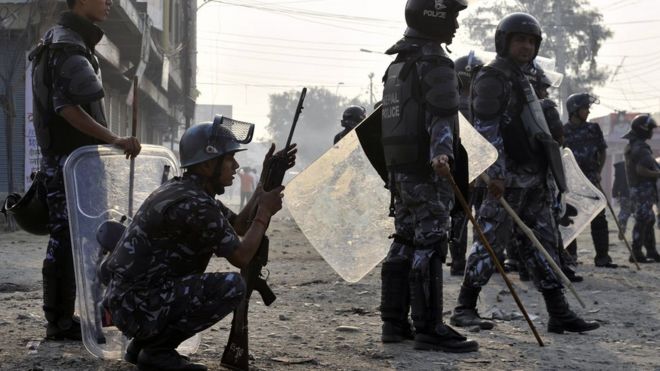 AFP
AFP
Nepal has been gripped by a blockade in the country's south for the past two months, leading to acute shortages of fuel and medicine.
The blockade is led by ethnic minorities who say they are discriminated against in the new constitution. The government also accuses India of deliberately worsening the embargo - something India denies.
The BBC looks at six ways the blockade has affected Nepal.
1. Chopping trees
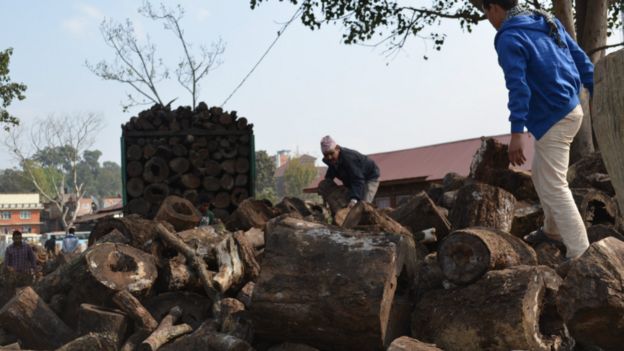
The crippling shortage of essential fuels such as liquefied petroleum (LP) gas, widely used for cooking in Nepal, has clearly put a lot of pressure on the country's forest resources.
Nepali newspapers are awash with reports of incidents of illegal logging in several forests in the unrest-affected Tarai plains of southern Nepal, which boasts some of the country's best lush green forests and national parks.
Officials say that, right now, things are still under control - but if the fuel supply situation doesn't return to normal, more and more trees could be chopped down by loggers and those in need.
Thakur Bhandari, an official at the Federation of Community Forest Users Nepal (FECOFUN), the umbrella body of the country's nearly 19,000 community forest user groups, says community-managed forests are safe as of now.
"But our forests have become vulnerable and difficult to protect now," as the demand for firewood for fuel surges, he told the BBC.
2. Medicines running low
One of the worst-hit supplies has been essential medicines.
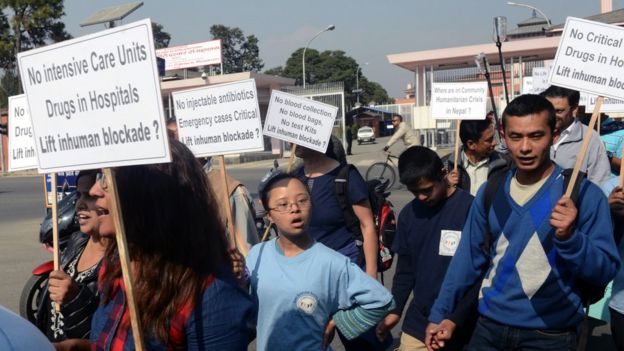 AFP
AFP
Procurement procedures, airport red tape and other factors have so far prevented hospitals in Nepal from flying in urgent medical supplies - and doctors warn of a humanitarian crisis within weeks if the shortages are not addressed.
Even major hospitals have said that they are running short of life-saving drugs such as those used in intensive care units.
In November, Unicef warned that more than three million children under the age of five were at risk of death or disease due to the acute shortage of fuel, food, medicines and vaccines.
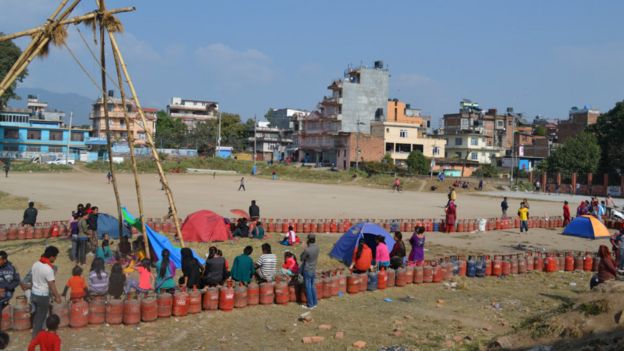
The government says it is trying to "fast-track" the process of buying essential medicines.
The protesters are accused of failing to keep a promise to let essential medicines through the blockade.
Read more on Nepal's crisis:
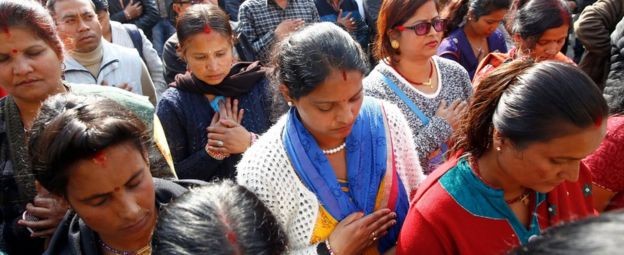 EPA
EPA3. No paper, ink or books
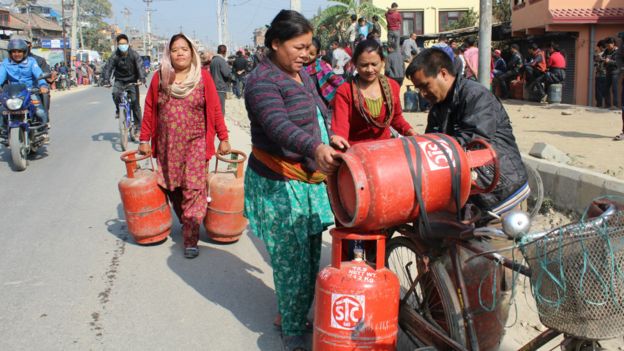
Due to lack of diesel to run their buses, many schools have been forced to hold brief holidays.
The government has started rationing diesel to schools to twice a week. "We have not totally closed schools but we are hit very hard," says private schools association president Lakchyya Bahadur KC.
The lack of fuel, paper and ink have also obstructed the printing of textbooks.
"We need to print 15 million textbooks in next four months. If the situation does not change, we will face shortages shortly," said a senior official at the Janak Educational Materials Centre - a government body that prints school textbooks for public schools.
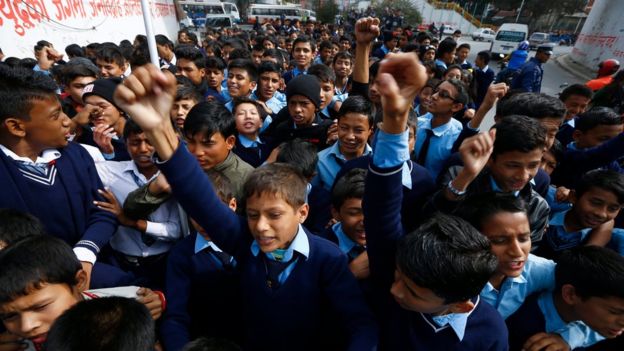 EPA
EPA4. Quake rebuilding in limbo
The Nepal earthquakes in April and May killed about 9,000 people, with nearly 600,000 houses damaged.
Now, the blockade has badly affected supplies of essential commodities, including construction materials and raw materials needed to run local industries, say government officials and UN agencies responsible for reconstruction work.
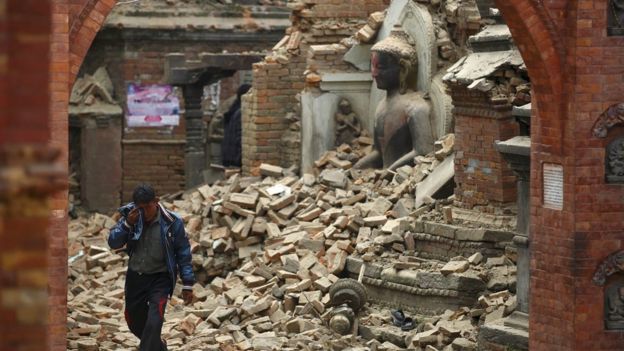 Reuters
Reuters
The bulk of vital supplies are stranded in border warehouses or in trucks on the other side of the Indian border, officials say.
Laxmi Prasad Dhakal, the spokesperson at the Ministry of Home Affairs, told the BBC: "We don't have enough fuel to ensure supplies of essential materials for reconstruction... to the earthquake areas.
"Until the crisis ends, rebuilding will remain in limbo."
5. Running on empty
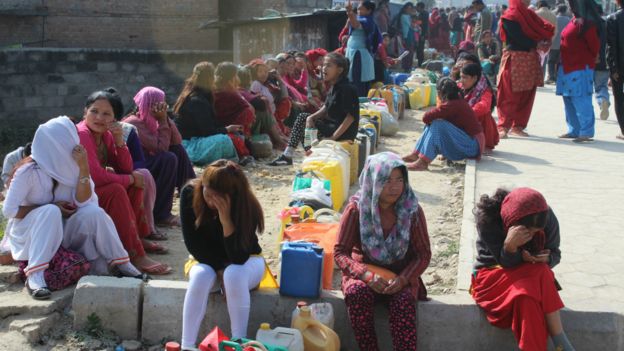
Nepal is dependent on India for its fuel - which has been rationed ever since the blockade.
Nepalese authorities said the Indian Oil Corporation is refusing to load their tankers in normal numbers and that Indian officials are deliberately obstructing the flow of fuel tankers even from the peaceful border points. India denies this.
It has been several weeks since gas stations have stopped selling fuel to private vehicles. Amid these restrictions, there are reports of rampant black marketing of fuel.
The shortage of cooking gas has taken toll in almost all households in the urban areas forcing them to switch to other alternatives like induction stoves and firewood.
The daily power cut of eight hours, which is projected to go up to 12 hours in the coming weeks, has made the situation worse.
6. Economic pain
On the economic front, the effect of the blockade has been brutal.
In November, Nepal's finance minister said he was lowering the growth forecast this year to 2%, from 6%. The minister said in the last three months, total trade had come down by one-third compared to the same period last year.
The earthquakes of April and May resulted in losses of over $7bn - but government officials are now saying that the blockade is going to inflict even bigger losses on the economy.
No comments:
Post a Comment